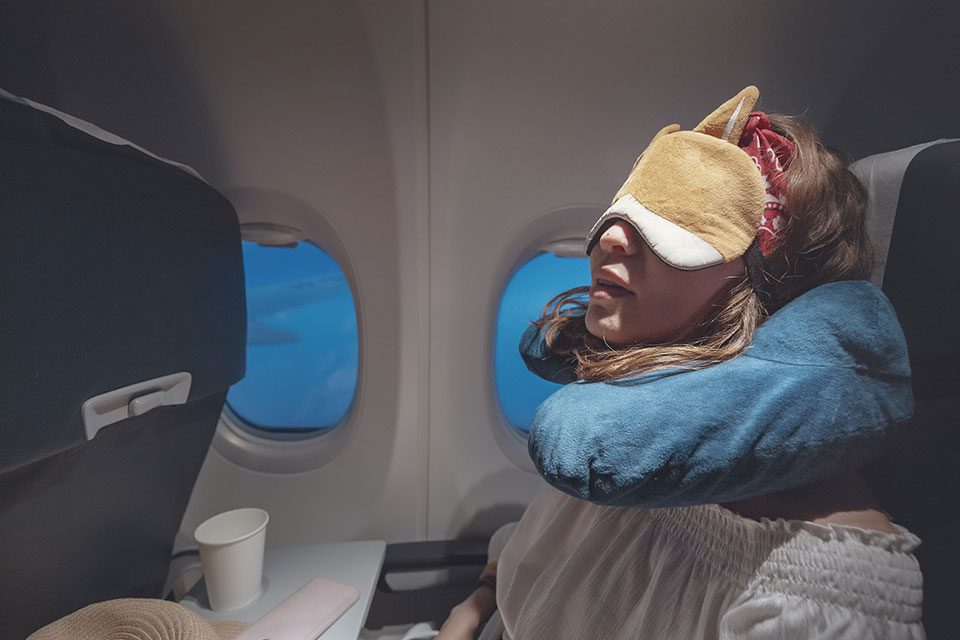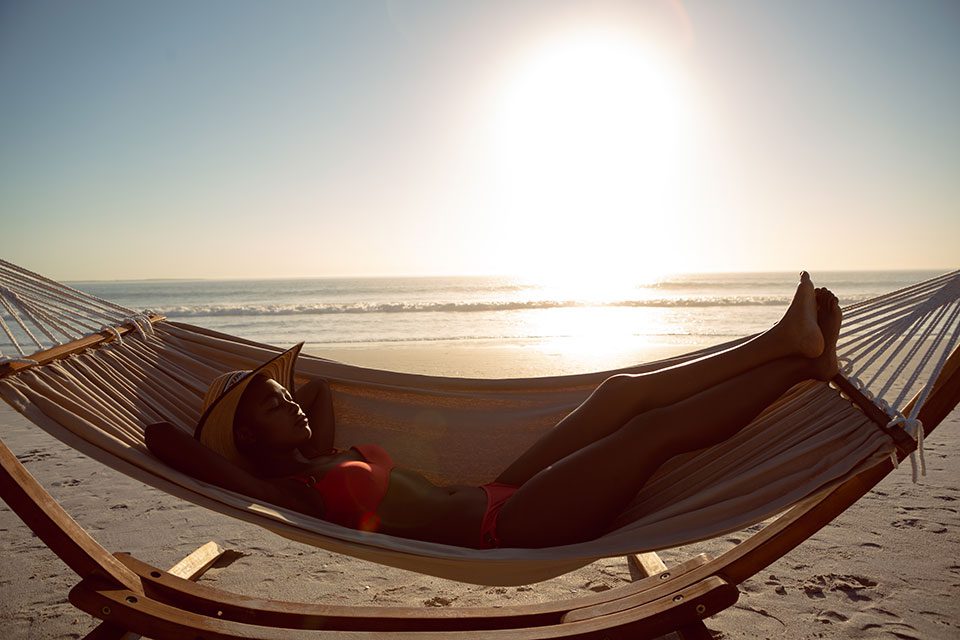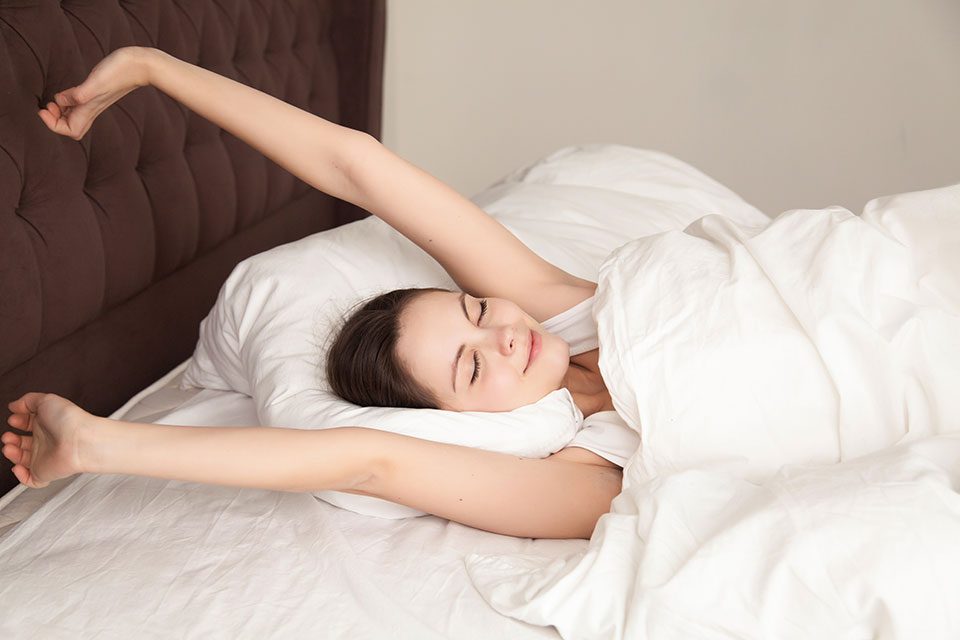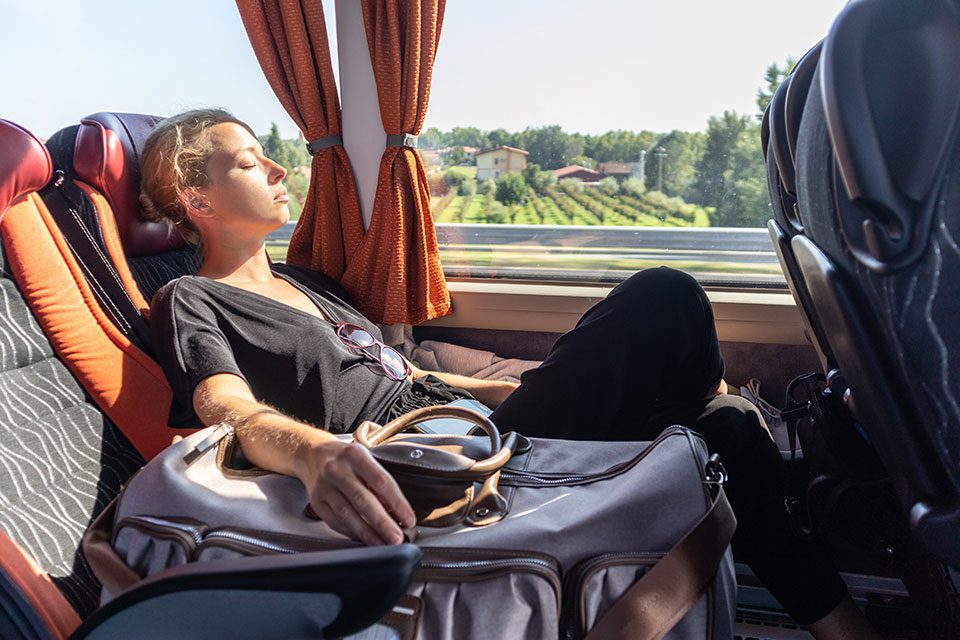Last updated on November 16th, 2023
Featured Image: Often underrated, sleep is the necessary evil in life that deserves more love. JourneyWoman Advisory Council member Shawna Robins is here to show you how to do that so you can be a better traveller. | Photo byt: kasto on Adobe Stock
Sleep Tips from Shawna Robins, JourneyWoman Advisory Council Member
Let’s face it: Women the world over are sleep-deprived. We’re overworked. Overstressed. Some of us make unhealthy food choices, particularly after a restless night. We’re on our screens far too often. And it’s impacting more than our sleep quality, energy, focus, careers and family life. According to research from Columbia University Irving Medical Center, it’s having a longer-term impact on our health.
The 2020 study, published in the Journal of the American Heart Association, found that women with worse overall sleep quality not only have a greater risk of heart disease but consume more of the added sugars associated with obesity and diabetes. Sobering findings, particularly in the pandemic era, where stress and worry have many of us reaching for unhealthy comfort food.

Catching z’s in an upright position can have negative impacts on your overall sleep habits but anything can be made better with a little love / Photo credit: EdNurg on Adobe Stock
“Of the six million Americans diagnosed with Alzheimer’s disease, two-thirds are women. Part of the factor with Alzheimer’s is that women don’t sleep. They don’t sleep because of their hormones. They don’t sleep because of their kids. They don’t sleep because of their worries, stress and anxieties, and it sets them up for neurodegenerative diseases as they age,” says Shawna Robins, sleep expert and member of our JourneyWoman Advisory Council. “Heart disease is the number-one killer of women. Why? Well, when you sleep your blood pressure naturally drops, so if you don’t sleep and your blood pressure stays elevated, that causes irreparable damage to the heart valves and cardiac walls. Sleep is an amazing gift that you can give yourself that can create amazing amounts of healing in your body.”
Travel – contorting into a pretzel to snag some z’s on a plane, crisscrossing time zones, sleeping in strange beds – exacerbates sleep issues. While few of us are travelling currently, there’s no better time than the present to show ourselves some love and develop the habits that will improve our sleep quality and create even better travel experiences in the future.
We sat down with JourneyWoman Advisory Council Member Shawna Robins (right) – author of Powerful Sleep: Rest Deeply, Repair Your Brain and Restore Your Life – to talk through her top tips for mitigating sleep disruptions and creating better-quality rest before, during and after travel.
We encourage you to print these tips out and put them into daily practice in preparation for the day when you start to travel again.

How to handle sleep disruptions while travelling and after returning home:
(especially if you’re changing time zones a few times)
- Take melatonin for the first few days of your trip, starting with the flight
- Regular sleep/wake cycles
- Get daily exercise
- Eat meals at set times
- Don’t get up when you wake up in the middle of the night
How to prep for sleeping in a strange bed:
- Create a sleep sanctuary
- Eliminate all light in the room
- Check the temperature (make sure you’re not too hot or cold)
- Use a white noise app, earplugs, etc.
How to prepare for a good night’s sleep on an overnight flight
- Don’t take a prescription sleep aid (eg. Benzos or Ambien)
- Don’t drink alcohol or binge-watch movies
- Drink 8 oz of water for every hour on the flight
- Create a sleep sanctuary in your seat
o Eat dinner, brush your teeth and get cozy
o Use earplugs/noise-cancelling headphones and a sleeping mask
o Get warm, use a blanket or weighted jacket
o Use relaxation techniques – music, meditation, audiobook
Successful sleep strategies for women over 40:
- Make good daytime decisions – eating well, exercise, lower stress levels
- Don’t eat or drink anything three hours before bed
- Turn off all blue light one hour before bed
- Journal – gratitude or happygrams, make a to-do list
- Limit alcohol intake (1-2 drinks per week)
- Take a warm bath or shower one hour before bed
- Don’t use melatonin or prescription sleep aids regularly – Instead, use magnesium, tulsi (holy basil) tea, lavender, or CBD

Vacations are rarely relaxing – take the time you need when you get home to get back on track with your sleep schedule. / Photo credit: webreakmedia_micro on FreePik.com
How to handle sleep disruptions while travelling and after returning home – especially if you’re changing time zones a few times:
“I think it’s remarkable when I hear people say they don’t get jet lag. I hear stories of people getting on a plane, drifting off for eight hours, and waking up refreshed in the new time zone. I’m sure there are people that can do that, but they’re unicorns. I’m not one of them,” says Robins.
Her top tips for reducing the effects of jet lag:
Take melatonin
Robins’ go-to when she travels: A three-day cycle of melatonin.
“I take it on the plane, I take 30 grams the first night I land, and then I cut it in half on the second and third night. I don’t do more than three days of melatonin,” she says. “Why? Melatonin is a hormone, and if you take it consistently, your body will stop producing its own – which will lead to more sleep problems down the road. So you want to give your body a little bit to kick it into gear so it can make its own and then slowly wean yourself off of it. I also recommend the same when you come back home.”
Keep regular sleep/wake cycles
Robins recommends staying on the same schedule on the road that you would at home in terms of wake-up and bedtimes.
“Don’t let yourself sleep until one o’clock in the afternoon. Get up, have breakfast. Do whatever it is you do when you’re at home. If you go to bed at 11 pm at home, do the same wherever you’ve travelled to,” Robins says. “I went to Iceland with my family last summer, and that was a real challenge for me because it never got dark, and that wasn’t something that I properly prepared for. I didn’t have the proper eye mask that would block out the light. The one I had was too thin. So I’ll do better next time I go to a Nordic country.”
Get daily exercise
We all know that moving our bodies has several health benefits, and one of the biggest is improved sleep. Robins recommends that we all get out there and move, especially when we’re travelling. It can be tempting to slug it out on vacation, but even 30 minutes of exercise daily has a positive impact.
“Daily exercise is a big thing. That’s the best part about travelling, right? You’re walking around cities and places, and you’re meeting people and building new neuropathways in your brain,” she says. “It’s great to make sure not just sitting in your hotel or on a tour bus. Get out, get off that bus, and move your body every day.”
Eat meals at set times
Robins says that it’s important to stick to the eating schedule you would at home. Do you eat breakfast? Make sure you don’t skip it on the road. Do you avoid triggering ingredients? Don’t disturb your digestive system by indulging heavily while travelling. If you’re going to honour the customs of other countries, like late dinners, ensure that you eat a healthy snack between lunch and dinner.
Don’t get up when you wake in the middle of the night
This is one of the biggest mistakes women make when they wake up and have trouble falling back to sleep. “Don’t get up. Just lay there and try to go back to sleep, even if you can’t. Your body is awake because it’s on a different time zone,” says Robins. “That’s okay. Just do some deep-breathing exercises, take it as an opportunity to do a meditation or write a gratitude list in your mind. Something that makes you feel calm, peaceful and happy. Try not to fight against wakefulness and see if your body can go back into another REM cycle on its own.”
Read More: Enjoying Travel During Menopause.
How to prepare for a good night’s sleep on an overnight flight
Sleeping on a plane in the best of conditions (in a comfy First Class pod) can be challenging. Finding a comfortable, sustainable sleep position in Economy seating is an exercise in squirming frustration. Wherever you’re seated, there are some things you can do to ensure better rest, if not a full sleep cycle.
Don’t take a prescription sleep aid (eg. Benzos or Ambien)
“As a health and wellness coach, I’m against prescription sleep aids. People want to get on a plane and take an Ambien or anti-anxiety meds. Maybe these are prescriptions or maybe they keep a bottle and take one every once in a while. I caution against doing that on a plane. There are so many things that can go wrong. Take melatonin instead,” says Robins.
Don’t take a prescription sleep aid (eg. Benzos or Ambien)
“As a health and wellness coach, I’m against prescription sleep aids. People want to get on a plane and take an Ambien or anti-anxiety meds. Maybe these are prescriptions or maybe they keep a bottle and take one every once in a while. I caution against doing that on a plane. There are so many things that can go wrong. Take melatonin instead,” says Robins.
Don’t drink alcohol or binge-watch movies
“You want to limit your alcohol consumption on flights. Alochol is a big sleep buster, and it messes not only with your blood sugar but with your REM sleep when you have it before bed,” Robins says. “I know people like to have a drink to relax on a plane. If you want to have a glass when you get on the flight, maybe three hours or so before you would naturally go to sleep, great. But I wouldn’t have much more. It’s going to dehydrate you. It’s going to affect your sleep. It’s goiong to make you feel worse when you land.”
Same goes for watching movies on repeat. The blue light of electronics and the mental stimulation won’t do you any favours in the sleep department. Watch one movie in the early leg of an overnight flight and switch to reading (in night mode if you’re reading on a reader or tablet, and wear blue light blockers).
Drink 8 oz of water for every hour on the flight
Ditch the booze in favour of water. It helps keep you hydrated – key for air travel, which tends to dehydrate you. But be sure to stop drinking three hours or so before you would naturally fall asleep to avoid having to wake up and use the restroom. Be sure to drink more water upon waking near the end of your flight.
Create a sleep sanctuary in your seat
Eat your dinner, brush your teeth, and get cozy. Whatever is in your sleep routine at home, keep it up on the plane. Do you listen to music, or an audiobook? Do you meditate? Bring that in to your in-flight wind-down.
“For me, I’ve got to be able to block out the light, so I bring a sleepmask. I’ve got to be able to block out the noise – so noise cancelling headphones or earplugs. I also really need a weighted blanket on me, so I bring a heavy, warm coat. I get cold on airplanes, so it kills two birds with one stone,” says Robins. “If I can do those three things and take a melatonin, I can typically knock off for six hours, which is about all I can do on a flight.”
How to prep for sleeping in a strange bed
You know how one of the things you look forward to most upon returning from travel is the bliss of sleeping in your own bed? Well, it’s also one of the first things you miss when you land in a strange bed. How to navigate this space?

Your bed is your sleep sanctuary and it can be hard getting used to a new one. Shawna shares tips on how to transition with ease. / Photo credit: yanalya on FreePik.com
Create a sleep sanctuary and block out light
Here, too, the concept of creating a sleep sanctuary can better your odds of getting the shut-eye you need. “For me, it’s the light. I’m one of those people who if there’s light in the room – on the TV, on the smoke detector – I will go around and take t-shirts, blankets and towels and cover everything I can so I have a pitch-black room. Of course, my husband rolls his eyes because he can sleep on a couch with light everywhere, but it’s a big deal for me,” says Robins.
Check the temperature
“Temperature is really important. Too warm? You’re not going to sleep very well. Too cold? Again, you’re not going to sleep very well. Everyone has a different temperature that works for their body. I highly recommend that you try to identify what your ideal temperature is before you travel, so you know exactly what to turn the thermostat to,” she says.
And what if you’re travelling with a partner who has a much different ideal temperature than you do? Don’t suffer in silence and lose sleep over it. Get creative.
“That is completely common. Sometimes, I will have extra blankets on my side of the bed because my husband likes it cold. I’ve come to embrace the colder rooms because I can get all snuggled like the Princess and the Pea underneath my layers of blankets and I always call down for an extra blanket and comforter. Embrace the differences and find the positive in them,” she says.
Block out noise (or create noise in the absence of it)
Use earplugs to block out offending city sounds. If you need background noise, as Robins does, use a white noise app.
Successful sleep strategies for women over 40
With age and fluctuating hormones come varying quality and quantity of sleep. We asked Robins for some strategies geared towards the over 40 set.
“I just turned 48 and wrote about this in my book. I never had trouble sleeping until I turned 47 and that was a game-changing year for me. I took my kid to college and then it was hot flashes every night. I was miserable,” she says. “One of the reasons my publisher encouraged me to write a sleep book is because that is something that is so commonplace. The long-term negative effects on women’s health come from not sleeping in your 40s. You’re setting yourself up for all those chronic illnesses later in life.”
So what to do?
Make good daytime decisions – eating well, exercise, lower stress levels
“The daytime decisions you make are what sets you up for healthy sleep or disrupted sleep. So you really need to look at the daytime decisions you’re making. What does your diet look like? Are you eating a diet of processed foods and sugar because you’re exhausted and craving sweets that give you quick energy? Well, that’s going to take your blood sugar and pop it up and down, which will disrupt your REM cycles at night,” Robins says. “It’s all about eating whole, nutritious foods and limiting sugar. Eat the rainbow – fresh fruits, vegetables and lean protein. If you’re interested in going plant-based, your 40s are a good time to consider it or try it. The more plants you can get in your body every day, the better off your hormones are going to be. Daily exercise is also key, especially getting outside for fresh oxygen and Vitamin D to boost your sleep cycles.”
Limit alcohol intake
“It’s a stressful time when you are in perimenopause, menopause or post-menopause, and we tend to lean on alcohol to calm us down. Try limiting the alcohol to two glasses a week. That sounds ridiculous, but it does amazing things for your body – lowering inflammation levels lowers breast cancer risk. For every drink you have over three drinks a week, your breast cancer risk goes up by 15% and then an additional 15% with each additional drink,” she says.
Turn off all blue light one hour before bed
“There’s a setting you can use on your device to turn off blue light – or simply unplug one hour before bed. It makes a big difference,” says Robins.
Don’t eat or drink anything three hours before bed
“I always say the brain is like a self-cleaning oven. You go to sleep, it clicks on, and it’s very active. It’s regenerating, it’s rebuilding, it’s cleaning, it’s storing your memories. So it’s about investing in your brain health and making sure you get seven to nine uninterrupted hours of sleep,” says Robins. “And typically, that means not eating or drinking anything three hours before bedtime. Because you don’t want to wake up and have to use the bathroom. You don’t want to wake up and your blood sugar drops because you had ice cream, a piece of toast or a banana.”
Take a warm bath or shower one hour before bed
“Really create a wind-down situation for yourself. Do what makes you feel calm and restful,” she says. “I love doing gratitude journals, or happygrams as my business coach calls them, where you make a list of everything that happened that day that made you feel happy. It’s so great because I sometimes look at that and go, oh wow, I had a better day than I thought I had,” says Robins. “I think of all these things that went wrong in my day, but when I gratitude journal or do happygrams, I actually realize all the terrific things that happened. That’s very calming and soothing. It helps lessen the anxiety that we sometimes get when we’re trying to fall asleep.”
Replace melatonin or prescription sleep aids with magnesium, tulsi (holy basil) tea, lavender, or CBD
“I recommend supplements like magnesium before you go to sleep. You can either put it in your bath in the form of Epsom salts, or you can drink it or take magnesium pills. Around 80% of Americans are deficient in magnesium and every single cell in your body can use it. It relaxes and soothes muscles – it’s a powerful hack that I use, and sometimes that’s it.” says Robins. “It’s not about making this overall lifestyle shift. It’s about making small changes that over time have a big impact on your health and well-being.”
What if you have successful sleep strategies in place and then experience a bout of insomnia, are at your breaking point, and it feels so much easier to reach for the simple (read: unhealthy) solution?
Both Robins and I feel your pain. The day I interviewed her for this article, she’d been up for three nights straight with her dog and joked about wanting to give him away to her neighbours. I’m a light sleeper who was once plagued by regular bouts of insomnia until I learned my personal sleep code – and created a routine around it.
It’s about knowing what works for you, and coming back to it, again and again. Coming back to you – whatever that looks like for you. For me, it’s yoga and meditation. Journaling. For Robins, it’s drinking a cup of tulsi (holy basil) tea, and meditating.
“I’m not a person who takes a bath at night. That’s okay. It’s about identifying what you’re stressed about – Haven’t been eating? Stressed out at work? Kids are sick? Worried about a loved one having COVID? – and then identifying things that work to calm you down,” she says. “I notice when I go a couple of days without meditating, I’m edgy and I think ‘why are all these things getting on my nerves?’ and then think ‘oh, right, because I haven’t done what I need to do for me.’ It always helps to have an accountability coach, whether that’s your sister, a friend, a trainer, nutritionist – someone that can remind you of what you already know. Because you already know what to do. Sometimes, you just forget because you’re so damned tired.”
Want a deeper dive into better sleep and overall health?
Download a free copy of Robins’ book here. She has also created a new program – Health, Your True Wealth – an 8-week online high-touch wellness program guiding you to create and implement your own unique roadmap to healthier habits that will have you sleeping better, feeling more energized, improving your brain health, and living more actively. She is offering a 50% program discount to JourneyWoman members. Email Robins at [email protected] for details.
Get to know Shawna and our other JourneyWoman Advisory Council Members here.
Read More on Wellness Travel
Travel with Purpose: Volunteering at a Turtle Conservation Project in Costa Rica Makes My Dream Real
As a volunteer on a turtle conservation project in Costa Rica with Conservation VIP, I fulfilled a long-held dream to help baby turtles.
Sisters Doing it for Themselves: Hiking the Himalayas in an All-Women Group in Nepal
Sarah O’Regan braves the elements in the Himalayas, finding sisterhood and tranquility with a social enterprise that empowers women.
Cactus Cocktails and Low-emission Coffee? What We Can Learn From the Caribbean Island of Bonaire
From cactus cocktails to low-emission cups of coffee, the Caribbean island of Bonaire, population 22,500, is a leader in sustainability, with lessons to teach about the transformative impact of travel.






Oral medications for Type Two Diabetes, High Blood Pressure, some anti depressants and psych meds, psoriasis medications, etc require a specific level of hydration be maintained consistently or you may experience significant dehydration rather quickly. Be absolutely sure you have consumed your entire daily water requirement prior to abstaining from water three hours before bedtime.
After 40 years of crippling insomnia, I started following a protocol devised by drgominak.com
I have now been sleeping like a normal person for 3 months. It has to do with your Vit D3 levels. Check it out! Nothing else ever worked for me for very long.